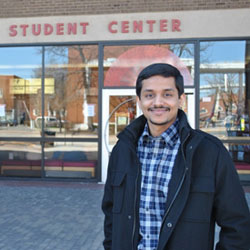Rutgers evening to explore 'Beyond What We Are'
TED is a nonprofit global network that brings together people from three worlds: Technology, Entertainment, Design (TED).

Rutgers Today: Tell me a bit about the parent organization, TED. What takes place at these conferences and who attends them?
Najmuddin: TED began in 1984 with a conference in Long Beach/Palm Springs, California, which brought together thought leaders to share ideas through presentations, discussions, entertainment. and art. Over the years some of the most inspired thinkers, such as Bill Clinton, Al Gore, Bill Gates, and Jane Goodall, have spoken at TED conferences. TED organizers, who believe passionately in the power of ideas to change attitudes and lives, felt they needed to open up these sessions more broadly, and in 2006, TED started releasing videos from the event on their website, TED.com. These videos became viral, and people started thinking, “I want this in my community, I want this at Rutgers, I want this in India, I want this in China.” That’s when TED came up with TEDx, designed to give communities, organizations, and individuals the opportunity to stimulate dialogue through TED-like experiences at the local level. This year there are about 750 TEDx events in more than 60 countries. TED today is much more than conferences – it’s a true global community of intellectuals and pioneers.
Rutgers Today: What made you decide to host a Ted conference at Rutgers?
Najmuddin: I became interested in TED while a part of the International Student Association (ISA), a group of undergraduates studying at Rutgers. My vision for TEDx was to give back to the local community from ISA. International students tend to stick together, they’re not as engaged and connected with the rest of Rutgers or central N.J or even the U.S. I wanted ISA students to have a platform to share ideas with people they normally wouldn’t come in contact with. Our theme last year, “Connecting the Unconnected,” aimed to bring all different people from different disciplines together. This year’s theme is “Beyond What We Are.” Now that we’re connected, let’s think about giving back to the community. The rock star team of ISA, led by Jyoti Jain, is what makes TEDxRutgers a successful conference.
Rutgers Today: TEDxRutgers, then, is a smaller version of TED. How are the two alike and different?Najmuddin: TEDx events are independently organized TED-like events. We run under their license, using their conference format, documentation, and guidelines. We promote their franchise and their mission: to provoke deep conversation and ideas worth spreading. At TEDx, a portion of the event is dedicated to sharing TED talks with the audience. TED talks are videos of speakers from the actual TED conference. Also, because TEDxRutgers organizers don't include anyone who has attended the actual TED conference, we have to cap our group at 100 people. If we can have one of our organizers to attend TED, we can make this a 500 people conference. We have the resources to do that, so if there are any TEDsters in the area, get involved! The difference between TEDxRutgers and TED is that our conference is smaller and people get to know each other better. We try to make it about the audience, hoping that people will connect. As participants walk in, we give them all high fives to amp up the energy. The back rows of seats are roped off so that everyone has to sit up front and close together. We encourage audience members to talk to one another and to take what they hear home with them to apply to their field.
Rutgers Today: How do people get the chance to attend TEDx and is it only for Rutgers students?
Najmuddin: We promote the event to Rutgers students but anyone can fill out a registration form on our website. Although, we can only accommodate to full capacity, an overwhelming number of people have showed interest in being part of TEDxRutgers. We use a strict criteria in picking attendees, giving priority to those who have registered early and attendees from the prior year. On the forms, applicants have a chance to tell us who they are and to talk about what they’re passionate about and why they want to come to the event. In essence, we want to know what they would bring to the table. We try to be fair and make decisions based on having a diverse group from different disciplines. The audience is about 30 to 40 percent undergraduates, 40 to 50 percent graduate students, and then the rest are professionals from central New Jersey. It’s a good mix. Click here for a list of this year’s speakers.